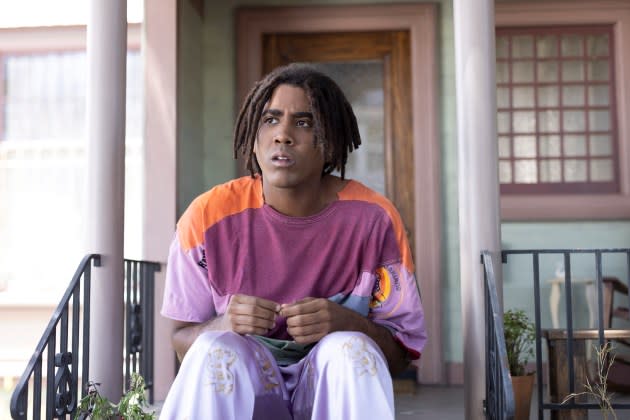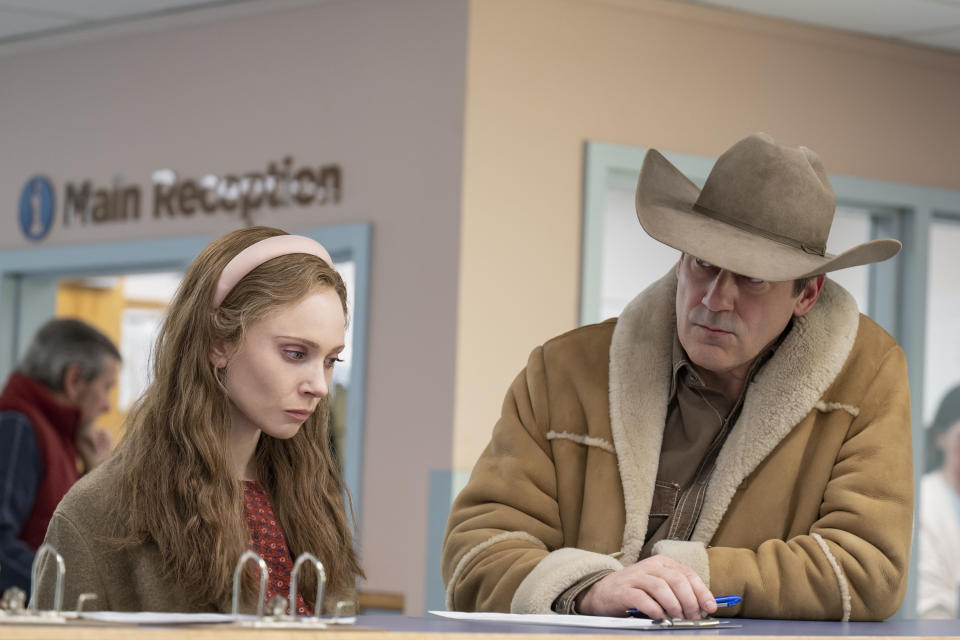‘I’m A Virgo’s’ Jharrel Jerome on Playing a Giant, Working with Boots Riley and His Music Career

“13-foot tall Black Man in Oakland.”
That’s how “I’m a Virgo” creator Boots Riley pitched his latest show to actor Jharrel Jerome. “This is the wildest title to an email I’ve seen. I don’t know what he’s talking about,” Jerome tells Variety‘s Awards Circuit Podcast. A week later, Riley was in his hotel room, with a briefcase painting a picture of how this show would look like – and he had mini figurines so Jerome could have a visual.
More from Variety
And yes, Jerome was concerned, he thought he’d be acting in front of a green screen all day long. But that wasn’t the case. Riley — who had the entire show mapped out in his mind, long before the streaming service was involved — wanted to do everything practical and in-camera. As part of that presentation, Riley showed how he’d use specific camera angles and incorporate miniature set pieces to make Jerome look like a giant.
On this edition of the Variety Awards Circuit Podcast, Jharrel Jerome discusses the casting process for “I’m a Virgo,” talks about fanning out working with co-star Walton Goggins, as well as his burgeoning music career and more. Also on this episode, “Fargo” exec producer Noah Hawley talks about his standout Season 5. Listen below!
The Amazon Prime Video series follows 19-year-old Cootie (Jerome), a 13 feet tall “giant.” He ends up under attack when the city of Oakland learns about his existence.
Jerome, whose credits include “Moonlight,” “When They See Us” and “Concrete Cowboy,” admits he was both scared and excited by the prospect of the character. Revealing how things worked on set to give the illusion of Cootie as a giant, he says, “I didn’t look at any of my scene partners in the eyes for any of the scenes. I had to either look at an X mark for an eyeline or a miniature doll that they designed.”
The in-camera practicalities meant scenes often took up to two hours to shoot because specificities were involved.
“I’m a Virgo” examines themes of capitalism, poverty and police brutality and its effects on the Black community while using fantasy elements to tell its story. After Cootie escapes from the safe world of his home, where his parents have been protecting him, Cootie experiences the real world for the first time. Along the way, he makes new friends, including Jones (Kara Young), a staunch Leftist. As part of his journey, Cootie who just wants to be treated like a normal person begins to search for ways to use his size in the fight against the evils of capitalism.
To get inside Cootie’s mindset, Jerome explains he stopped looking at the character as a giant. Instead, he approached the character as someone experiencing childlike wonder. “I played into his fragility pretty much and his naivete.” He continues, “He’s 19 years old, but he’s been confined in his life and confined in his home his whole life by his parents.”
Jerome also talks about his quiet fanboy moment. In the series, he acts opposite Walton Goggins who plays The Hero, a sinister vigilante who he goes toe-to-toe with. Having admired Goggins’ work in “The Hateful Eight,” was a moment for the young actor. “He’s a legend,” says Jerome.
Later in the episode, Jerome admits to being a huge Quentin Tarantino fan, having watched his films while in school. “I saw ‘Reservoir Dogs’ first. And then I saw ‘Pulp Fiction’ right after. After that, it was set for me in terms of what kind of films I loved. He shaped what kind of films I ended up falling in love with, and that’s character-driven films.”
When he’s not acting, Jerome turns his attention to his other love, music. He made his music debut in 2020 with the single “For Real.” And while he has released a single here and there, that space, for now, is for him. “I do it because of me. No one’s ever told me to do it.”
Writing music is something he considers to be therapeutic and is constantly inspired by. He pulls out his phone and opens his Notes app. It is an endless scroll of notes that he has made at all hours of the day. He has an idea for a song that he wants to write inspired about not being in a person’s life anymore. “It might be a heartbreak song. It’s a song about this house that’s far away,” he teases.
He certainly has the material to drop an album – he has over 400 songs on his phone. “I could listen to my music for 10 days straight,” he laughs. “I’m going to succeed in the music. I feel confident in it,” he promises.
Having filmed “I’m A Virgo” and dabbled in the fantasy world, he admits to watching more fantasy films and having a deeper appreciation for them. No, he hasn’t seen the Harry Potter films or the “Lord of the Rings” films, but they’re on his list.
“I could play a talking dragon,” he jokes.
Boots Riley if you’re listening…

Meanwhile, also on this episode, “Fargo” season 5, which premiered last november, stars Juno Temple as Dorothy “Dot” Lyon, a Minnesota housewife whose dark secrets are about to be revealed — now that ruthless North Dakota sheriff Roy Tillman (played by Jon Hamm) has found her. Roy is a rancher, preacher and constitutional lawman who believes that only he is above the law.
“Fargo” exec producer Noah Hawley discussed the challenges of shooting globally, including both in Canada for “Fargo” and in Thailand for his upcoming “Alien” TV series, and how it’s become necessary because of tax incentives and soundstage availability.
Hawley also discusses the unique tone and vibe of “Fargo,” despite changes in setting, cast, and time period. “I really wanted to look at this idea of Minnesota Nice, which Joel and Ethan [Coen] kind of defined in the movie Fargo, which is, which is basically people who don’t know how to be anything but polite. And and so, as their stress level goes up, they don’t know how to express themselves. And so they don’t, they can’t bend, they just break.
“But there’s nothing passive about the aggression we see in our country right now,” he says. “Nobody’s pretending to be nice anymore. That basic decency, that social contract, how do we get that back? Which is a big part of Dot’s journey [in Season 5]. She wants to be that decent person: Loving marriage, raising her daughter. The world keeps coming at her to say no, we’re gonna force you to live in in this other world — and she refuses to live in that world.”
Hawley notes that British humor and Jewish humor both impacted his writing style and can be seen in “Fargo.” “‘Hitchhiker’s Guide to the Galaxy,’ Douglas Adams was a huge influence on me,” he says. “And my father had spent time over in in England, and brought back a bunch of the Goon Show records, Peter Sellars and Spike Milligan. I grew up listening to those really absurdist radio plays. And then, of course, ‘Monty Python’ came came along. And so all of those elements of that sort of dryness, the absurdity of it, they’re a little bit mean, but but not unkind. But then on the other side, I also have the, the long tradition of Jewish humor. And there’s, there’s some interesting similarities in a way and that’s the Cohens’ tone of voice I feel like marries up well with with the British sensibility, especially when it lands in in the Midwest.”
As for casting Hamm — who has been straddling both comedy and drama in his career in recent years — Hawley says, “Jon Hamm is a Muppet. When you when you hang out with him, he is one of those faces those elastic faces, and he’s his game for anything. He he understands the comedy instinctually but he’s also the straight man at the same time.”
Later, we discuss the season finale, including satisfying conclusion to Jon Hamm’s character’s storyline, as well as the themes of justice and responsibility in a society, with a focus on the character of Roy Tillman and his representation of Trumpism.
Then, Hawley shares his take on reinventing the “Alien” franchise, how it’s separate from the movie franchise and will have its own mythology.
Variety’s “Awards Circuit” podcast, produced by Michael Schneider, is your one-stop listen for lively conversations about the best in film and television. Each week “Awards Circuit” features interviews with top film and TV talent and creatives; discussions and debates about awards races and industry headlines; and much more. Subscribe via Apple Podcasts, Stitcher, Spotify or anywhere you download podcasts. New episodes post weekly.
Best of Variety
Emmy Predictions: Documentary and Reality Categories Heat Up With Two Weeks Left Until Voting Begins
Sign up for Variety’s Newsletter. For the latest news, follow us on Facebook, Twitter, and Instagram.


